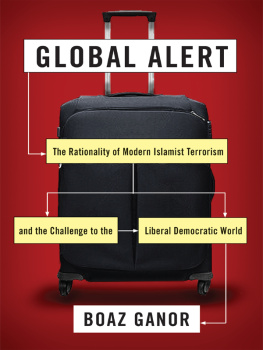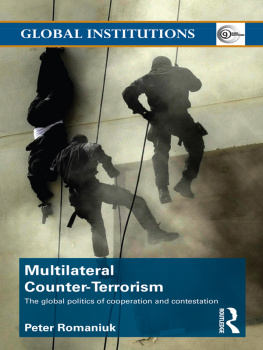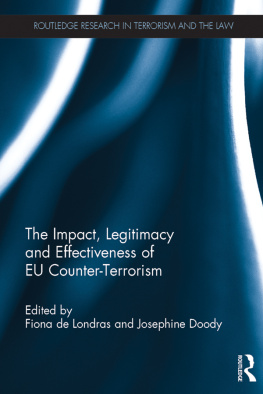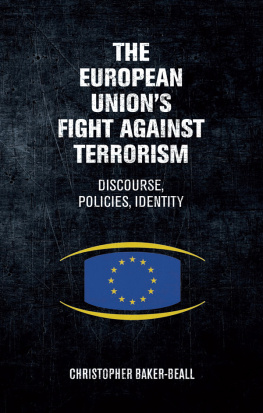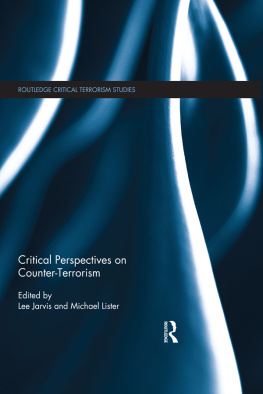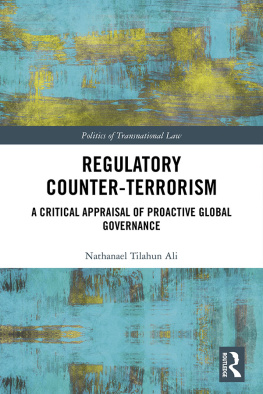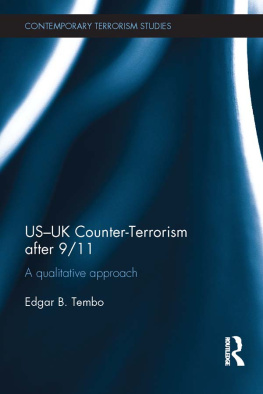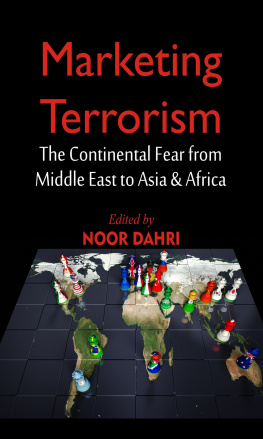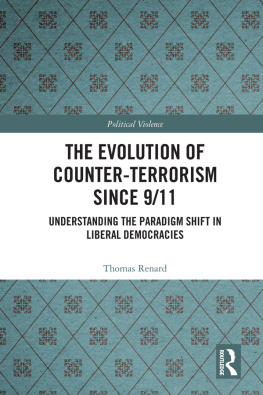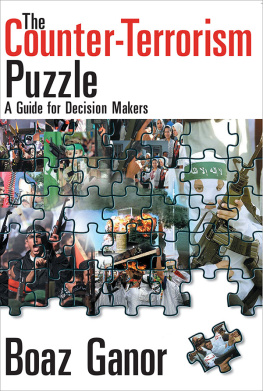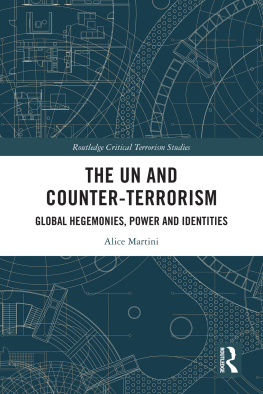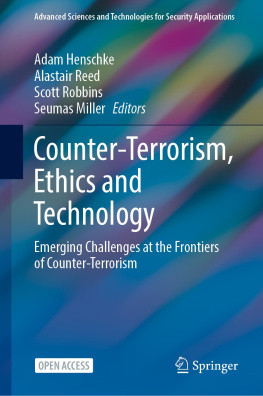GLOBAL ALERT
COLUMBIA STUDIES IN TERRORISM
AND IRREGULAR WARFARE
COLUMBIA STUDIES IN TERRORISM AND IRREGULAR WARFARE
Bruce Hoffman, Series Editor
This series seeks to fill a conspicuous gap in the burgeoning literature on terrorism, guerrilla warfare, and insurgency. The series adheres to the highest standards of scholarship and discourse and publishes books that elucidate the strategy, operations, means, motivations, and effects posed by terrorist, guerrilla, and insurgent organizations and movements. It thereby provides a solid and increasingly expanding foundation of knowledge on these subjects for students, established scholars, and informed reading audiences alike.
Ami Pedahzur, The Israeli Secret Services and the Struggle Against Terrorism
Ami Pedahzur and Arie Perliger, Jewish Terrorism in Israel
Lorenzo Vidino, The New Muslim Brotherhood in the West
Erica Chenoweth and Maria J. Stephan, Why Civil Resistance Works: The Strategic Logic of Nonviolent Resistance
William C. Banks, New Battlefields/Old Laws: Critical Debates on Asymmetric Warfare
Blake W. Mobley, Terrorism and Counterintelligence: How Terrorist Groups Elude Detection
Guido W. Steinberg, German Jihad: On the Internationalization of Islamist Terrorism
Michael W. S. Ryan, Decoding Al-Qaedas Strategy: The Deep Battle Against America
David H. Ucko and Robert Egnell, Counterinsurgency in Crisis: Britain and the Challenges of Modern Warfare
Bruce Hoffman and Fernando Reinares, editors, The Evolution of the Global Terrorist Threat: From 9/11 to Osama bin Ladens Death
BOAZ GANOR
GLOBAL ALERT
The Rationality of Modern Islamist Terrorism and the Challenge to the Liberal Democratic World
Columbia University Press / New York
Columbia University Press
Publishers Since 1893
New York Chichester, West Sussex
cup.columbia.edu
Copyright 2015 Columbia University Press
Chapter three first published, in slightly different form, in William C. Banks, ed., Shaping a Global Legal Framework for Counterinsurgency: New Directions in Asymmetric Warfare
(Oxford: Oxford University Press, 2012). By permission of Oxford University Press.
All rights reserved
E-ISBN 978-0-231-53891-6
Library of Congress Cataloging-in-Publication Data
Ganor, Boaz.
Global alert : the rationality of modern Islamist terrorism and the challenge to the liberal democratic world / Boaz Ganor.
pages cm. (Columbia studies in terrorism and irregular warfare)
Includes bibliographical references and index.
ISBN 978-0-231-17212-7 (cloth : alk. paper) ISBN 978-0-231-53891-6 (ebook)
1. TerrorismIslamic countries. 2. TerrorismReligious aspectsIslam. 3. TerrorismPrevention. I. Title.
HV6433.I74.G36 2015
363.325dc23
2014029475
A Columbia University Press E-book.
CUP would be pleased to hear about your reading experience with this e-book at .
Cover design: Noah Arlow
Cover image: Geoff Spear
References to websites (URLs) were accurate at the time of writing. Neither the author nor Columbia University Press is responsible for URLs that may have expired or changed since the manuscript was prepared.
CONTENTS
1. INTRODUCTION TO MULTIDIMENSIONAL WARFARE:
Defining Terrorism, Redefining War
10. THE RATIONALE OF THE MODERN ISLAMIST TERRORIST ORGANIZATION:
Hamas as a Case Study
T HIS BOOK IS dedicated to my wife, Amit Ganor, and my children, Lee, Tom, and Dan, as an expression of my love and gratitude for their understanding and support through all the years of my professional work and especially during the writing of this book. The book is also dedicated to my parents of blessed memory, Shulamit and David Ganor, who instilled in me the passion for learning, research, and writing.
It would be impossible for me to thank all of my colleagues who advised and guided me during the research phase of this book, but special thanks are due to Marsha Weinstein, who translated and edited the book with exceptional skill and professionalism, and above all to my assistant and dear friend Stevie Weinberg, director of operations at the International Institute for Counter-Terrorism (ICT), who played a valuable and central role in preparing the book for publication.
I would like to thank my friends and acquaintances who supported the publishing of this bookShabtai Shavit, former head of the Mossad and chairman of the ICT board of directors; Congressman Peter King, member of the Homeland Security Committee and chairman of the Subcommittee on Counterterrorism and Intelligence; Judge Jean-Louis Bruguiere, former head, Counter-Terrorism Unit, Paris District Court, and former leading French magistrate for investigating counterterrorism, France; Fernando Reinares, professor of political science, Universidad Rey Juan Carlos, and senior analyst on international terrorism, Real Instituto Elcano Madrid, Spain; and Brian Jenkins, senior advisor to the president, RAND Corporation. In addition, I want to thank Columbia University Press and editor Anne Routon, as well as Columbia Studies in Terrorism and Irregular Warfare series editor Bruce Hoffman.
In conclusion, I would like to thank Uriel Reichman, founder and president of the Interdisciplinary Center (IDC), Herzliyamy academic homewhose distinct academic vision and initiative prompted his constant support of all my academic activities throughout the past two decades, both at the ICT and in personal endeavors. I also am grateful to Ambassador Ronald S. Lauder, who granted me the Chair for Counter-Terrorism at the Lauder School of Government, Diplomacy, and Strategy, as well as my dear friends Daniel Jusid Man and Daphna and Gerry Cramer.
T O EACH AGE its challenges. Barely over half a century ago, the international community grappled with fascism; less than half that time ago, it seemed that communism would be the scourge to end all scourges. The formation, dismantling, and re-formation of nations and nation-blocs of the past century and a half have been accompanied by changes in the way wars are fought, and in where and how they are fought. Although terrorism is not a modern phenomenon, it has in the modern age continued to don and slough off various incarnations: from state terrorization of civilian populations during World War II, through the anti-colonial campaigns of the Viet Minh and EOKA, to the anarchistic and nationalistic terrorism of the Red Brigades, IRA, and PLO. Recent years have seen an increase in the religious-ideological terrorism of Islamist-jihadists, whose manipulation of supportive civilian populations so as to wield violence against other civilians whom they regard as infidels represents a perfecting of modern terrorist strategies. Islamist-jihadist terrorisma plague that has spread to almost every corner of the worldcreates painful dilemmas for the peoples and decision makers who confront it. Its rapid, shape-shifting advance has sometimes confounded efforts to comprehend its origins, motives, and aims. Its sophistication in exploiting liberal values poses challenges and difficulties for the Western world, and for liberal democratic states in general, in attaining effective and balanced counter-terrorism policies. It is this gap in the understanding of Islamist-jihadist terrorism, as an offshoot and development of modern terrorism, that Global Alert wishes to bridge.
begins the work of bridging the gap in understanding current trends and challenges in countering Islamist terrorism by providing a historical perspective on modern terrorism, as opposed to traditional warfare. It proposes a definition of terrorism, which takes into account the difficulty that the international community has so far had in reaching consensus on such a definition. It also reviews the reaction of todays terroristsIslamist terrorists among themto liberal democracy, including their warped interpretation of modern liberal democratic governance and attempts to undermine it to achieve their aims.

